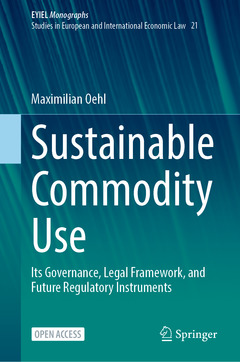Sustainable Commodity Use, 1st ed. 2022 Its Governance, Legal Framework, and Future Regulatory Instruments EYIEL Monographs - Studies in European and International Economic Law Series
Auteur : Oehl Maximilian Eduard

?Sustainable Commodity Use? is based on a comprehensive analysis of over 250 international agreements, standards, and guiding documents. The author distils the main findings into a conceptualisation of Transnational Commodity Law and provides the reader with a succinct overview of its normative configurations as well as regulatory gaps. Moreover, he elaborates a taxonomy of International Commodity Agreements. In addition, an outline of the normative substance of Transnational Commodity Law features in an appendix to the main text.
The author concludes by making concrete suggestions on how rules regulating commodity activities de lege ferenda could and should be designed to improve the effectiveness of law regulating transnational commodity activity. In doing so, he demonstrates the application of the sustainable use principle as the overall objective and purpose of Transnational Commodity Law and discusses International Commodity Agreements as future regulatory instruments.
This book may assist lawmakers, practitioners, civil society advocates, and academics worldwide in developing a legal framework for sustainable global commodity activity.
Provides conceptual clarity with regard to the transnational legal framework of commodity use
Illustrates the operation of sustainable development as a legal concept in the context of commodity activities
Analyses over 250 international agreements guidance documents and standards
This book is open access, which means that you have free and unlimited access
Date de parution : 12-2021
Ouvrage de 307 p.
15.5x23.5 cm



